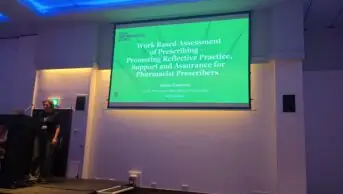
istockphoto.com
Of the 50,312 pharmacists on the General Pharmaceutical Council (GPhC) register, 2,049 are qualified as independent prescribers. An independent prescribing qualification allows a pharmacist to clinically assess and diagnose a patient, and then prescribe any treatment within his or her competence, excluding three drugs for the treatment of addiction. Pharmacists typically obtain their qualification while working in a particular specialism, but can move into a different area once they have qualified.
The drive to encourage pharmacists to qualify as independent prescribers seems to be gathering momentum. The Scottish government’s report ‘Prescription for Excellence’ outlines plans for all pharmacists to become qualified as prescribers by 2023. Similar plans are afoot in Wales.
Attempting to train every pharmacist to be a prescriber is no small undertaking. One way to approach this, as suggested at a recent GPhC meeting in London for independent prescribers, would be to require all pharmacy students to obtain a prescribing qualification during their undergraduate course, in order to graduate as both pharmacists and prescribers.
This double qualification was discussed in a 2010 report, which informed the work of a Modernising Pharmacy Careers (MPC) programme board. This group was set up to provide advice about pharmacy education, training and UK workforce planning and is now part of NHS Health Education England. It recommended that all pharmacists should be able to amend prescriptions, medicines orders and patients’ drug charts. Additionally, they could make prescribing decisions within existing supplementary prescribing mechanisms, which allow healthcare professionals to prescribe medicines within a patient-specific clinical management plan, agreed by a doctor or dentist. The report states: “It is not, however, envisaged that pharmacists should become independent prescribers at the point of registration.”
Although it is sensible and progressive to better equip undergraduate students with skills in clinical decision-making, achieving both pharmacy registration and a prescribing qualification concurrently may be too much for a student to take on. Experienced practitioners can find it challenging to maintain the confidence and competence to prescribe, even within their own specialisms, so it would be a tall order to expect this of newly qualified pharmacists.
Moreover, if all pharmacists were eventually registered as prescribers, there is no guarantee that they would all be able to use their qualifications. According to a survey by the GPhC, only 61% of pharmacist prescribers reported having prescribed in the previous 12 months and fewer than 75% had ever written a prescription. Many pharmacists cite a lack of opportunity as a reason for this.
It would seem that many roles are developed by pharmacists themselves, who find a local need for an independent prescriber in a specialist service and so gain the necessary qualification. The full remit of the prescriber — including examining patients, making diagnoses and prescribing new treatments — is not required in most pharmacy roles.
This is a problem for the ambitions of the Scottish government. Independent prescribing is well positioned as a tool for advancement for certain people, but systemic changes are required before the qualification could be considered a must-have by all pharmacists.
Nonetheless, the ability to amend prescriptions, correct prescribing errors and advise patients to stop taking prescribed medicines would be useful in many pharmacy roles right now. Perhaps, then, these could be the additional skills with which new pharmacists should graduate — as suggested by the MPC report in 2010. Pharmacists would need the legal authority to perform these activities without obtaining a full prescribing qualification.


